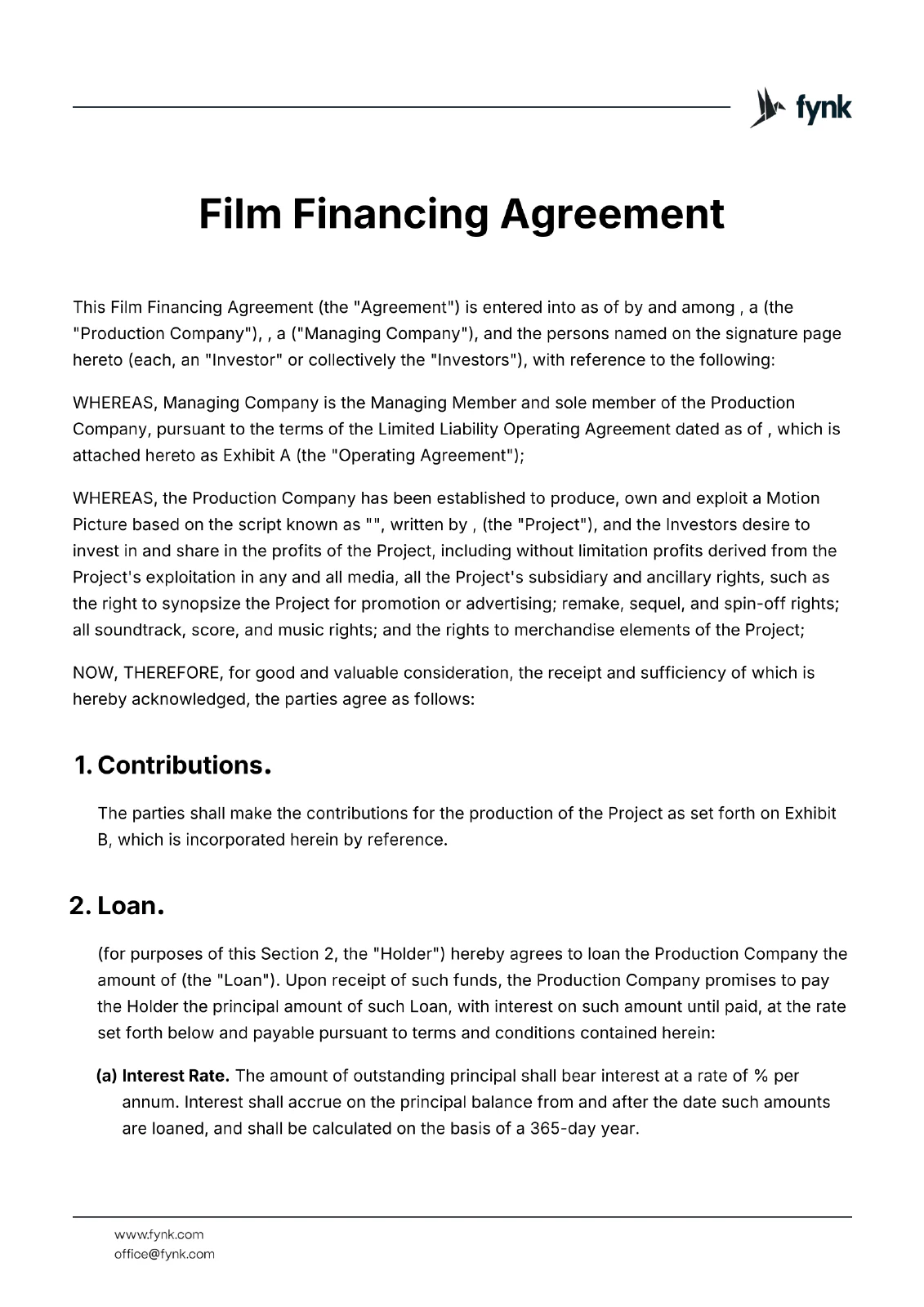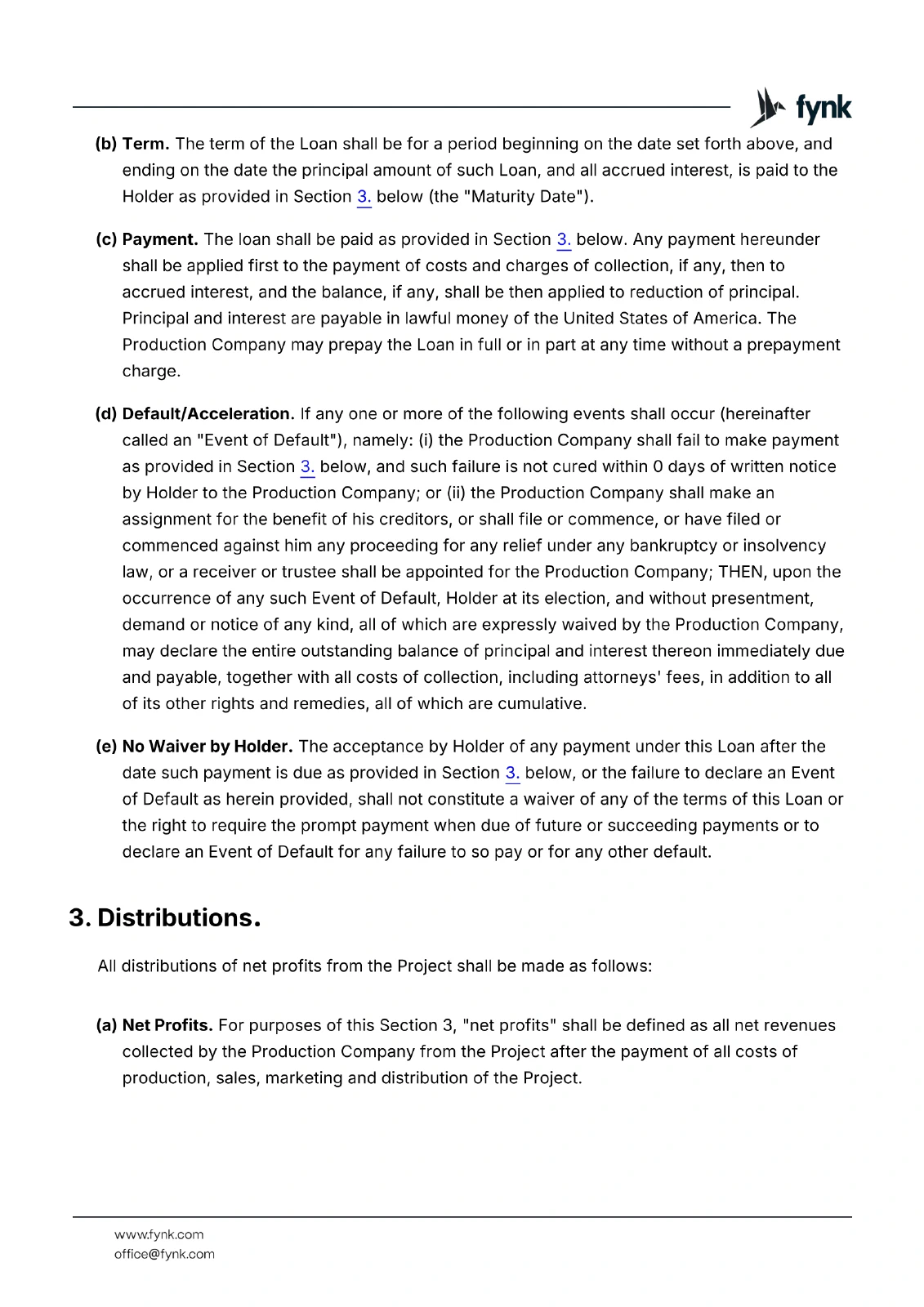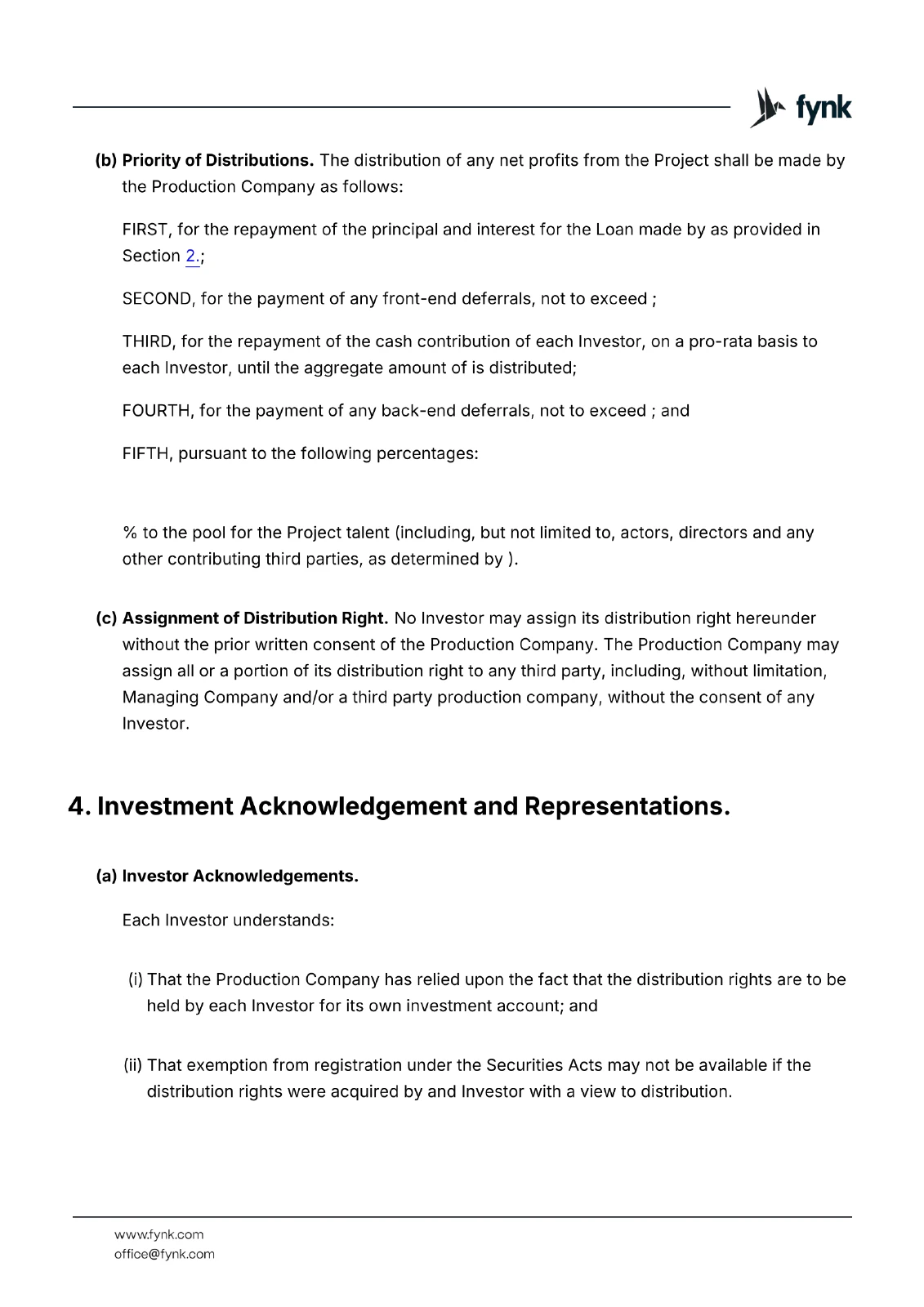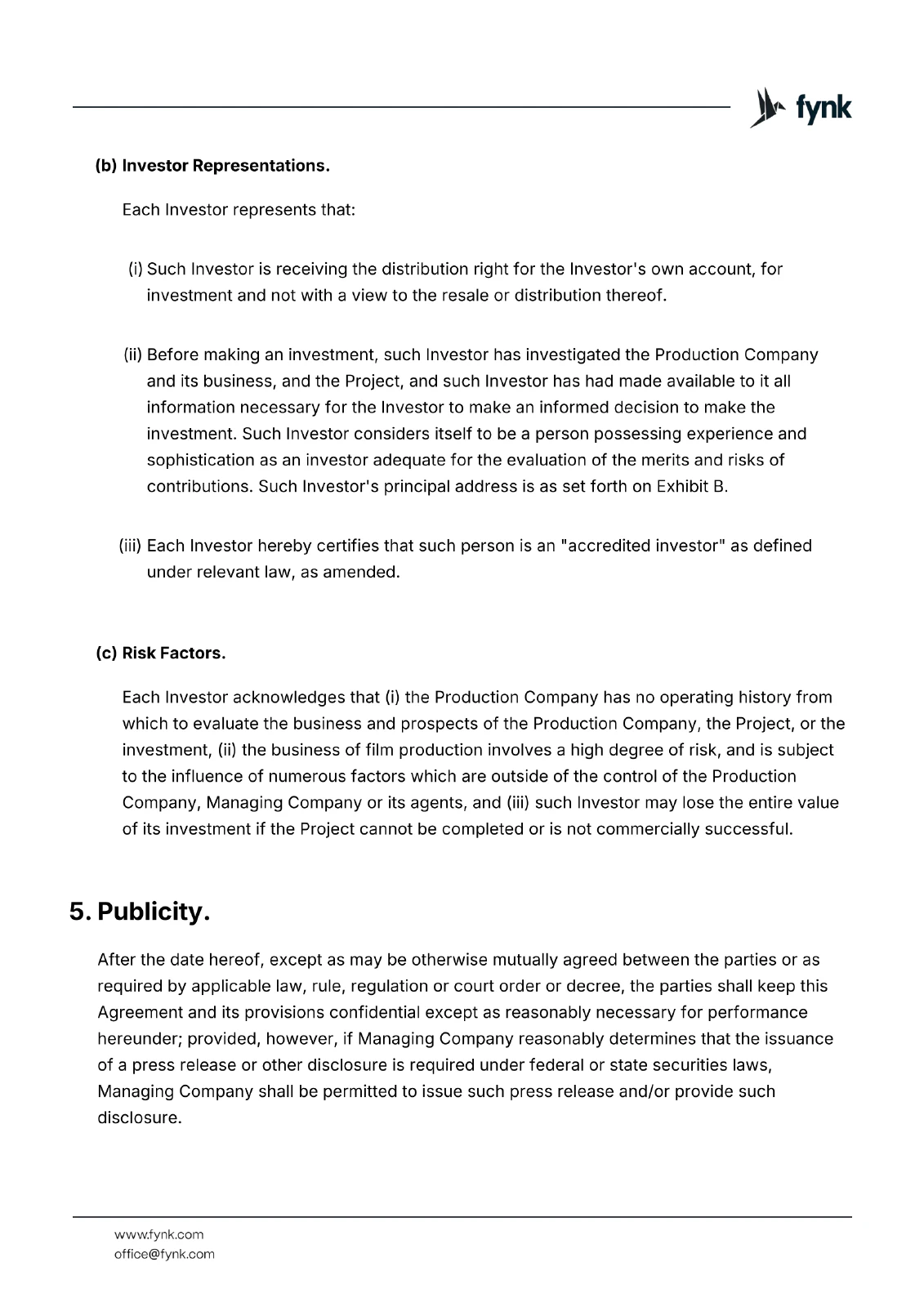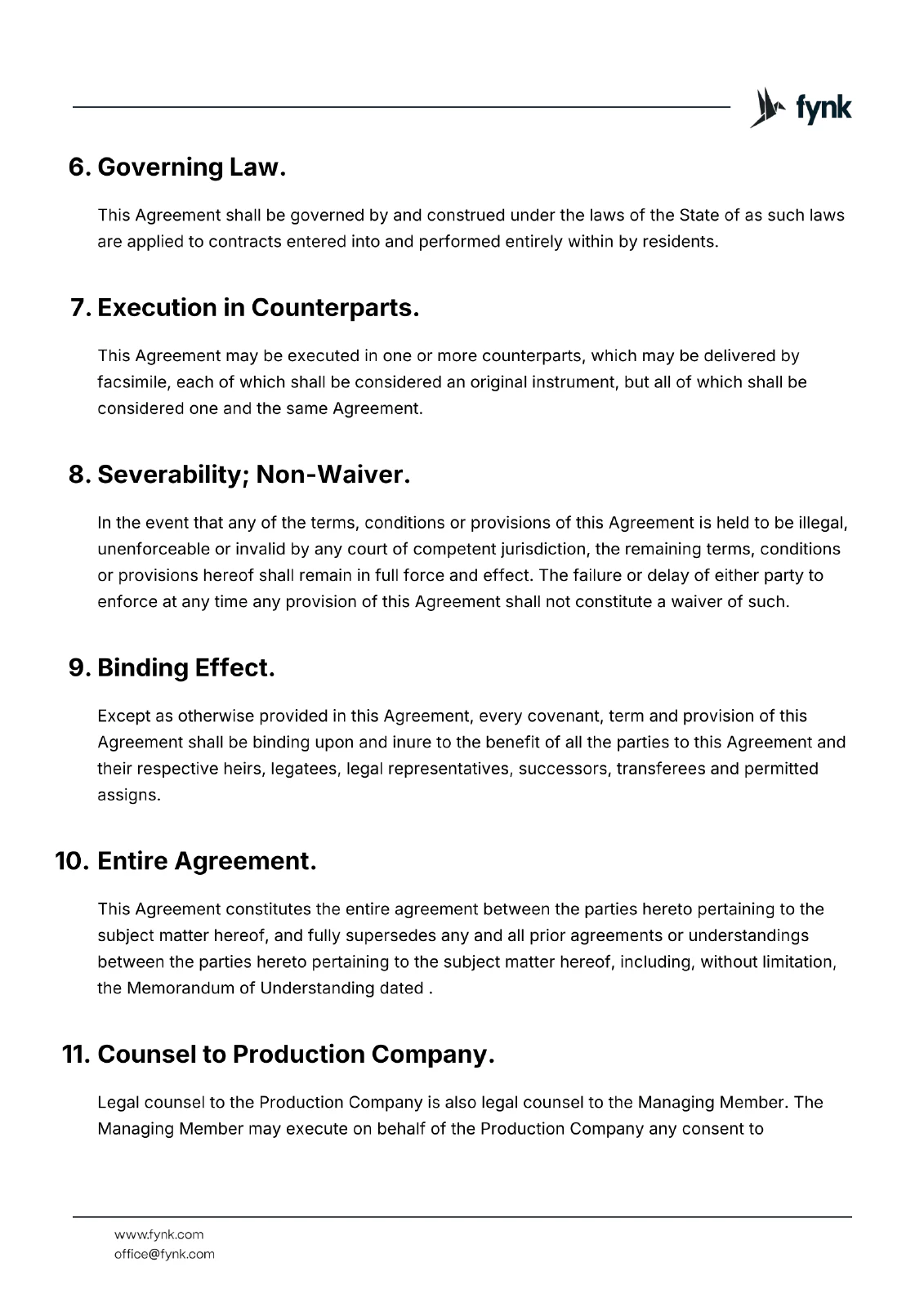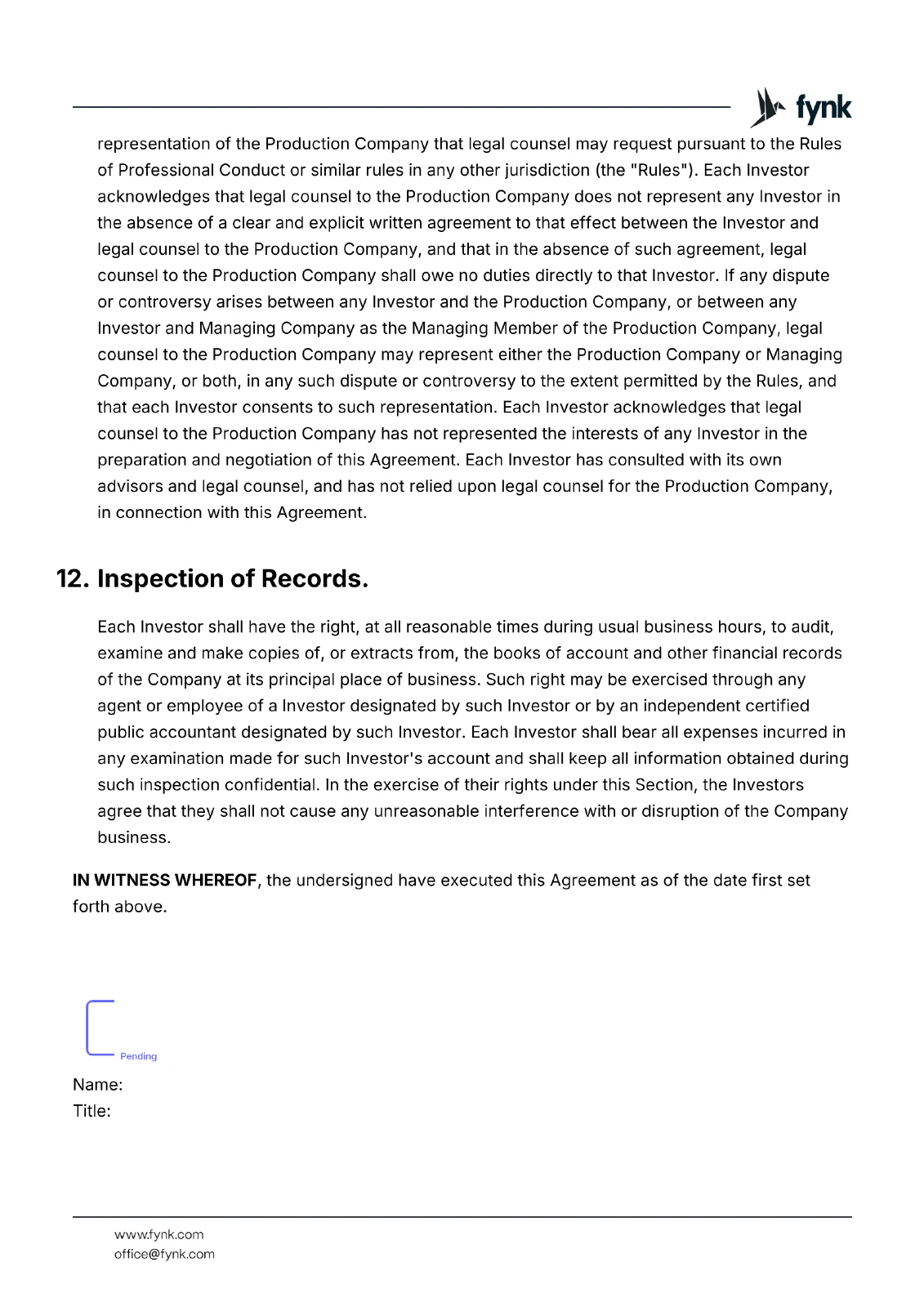Film Financing Agreement
This Film Financing Agreement (the "Agreement") is entered into as of by and among , a (the "Production Company"), , a ("Managing Company"), and the persons named on the signature page hereto (each, an "Investor" or collectively the "Investors"), with reference to the following:
WHEREAS, Managing Company is the Managing Member and sole member of the Production Company, pursuant to the terms of the Limited Liability Operating Agreement dated as of , which is attached hereto as Exhibit A (the "Operating Agreement");
WHEREAS, the Production Company has been established to produce, own and exploit a Motion Picture based on the script known as "", written by , (the "Project"), and the Investors desire to invest in and share in the profits of the Project, including without limitation profits derived from the Project's exploitation in any and all media, all the Project's subsidiary and ancillary rights, such as the right to synopsize the Project for promotion or advertising; remake, sequel, and spin-off rights; all soundtrack, score, and music rights; and the rights to merchandise elements of the Project;
NOW, THEREFORE, for good and valuable consideration, the receipt and sufficiency of which is hereby acknowledged, the parties agree as follows:
Contributions.
The parties shall make the contributions for the production of the Project as set forth on Exhibit B, which is incorporated herein by reference.
Loan.
(for purposes of this Section 2, the "Holder") hereby agrees to loan the Production Company the amount of (the "Loan"). Upon receipt of such funds, the Production Company promises to pay the Holder the principal amount of such Loan, with interest on such amount until paid, at the rate set forth below and payable pursuant to terms and conditions contained herein:
Interest Rate. The amount of outstanding principal shall bear interest at a rate of % per annum. Interest shall accrue on the principal balance from and after the date such amounts are loaned, and shall be calculated on the basis of a 365-day year.
Term. The term of the Loan shall be for a period beginning on the date set forth above, and ending on the date the principal amount of such Loan, and all accrued interest, is paid to the Holder as provided in Section 3. below (the "Maturity Date").
Payment. The loan shall be paid as provided in Section 3. below. Any payment hereunder shall be applied first to the payment of costs and charges of collection, if any, then to accrued interest, and the balance, if any, shall be then applied to reduction of principal. Principal and interest are payable in lawful money of the United States of America. The Production Company may prepay the Loan in full or in part at any time without a prepayment charge.
Default/Acceleration. If any one or more of the following events shall occur (hereinafter called an "Event of Default"), namely: (i) the Production Company shall fail to make payment as provided in Section 3. below, and such failure is not cured within 0 days of written notice by Holder to the Production Company; or (ii) the Production Company shall make an assignment for the benefit of his creditors, or shall file or commence, or have filed or commenced against him any proceeding for any relief under any bankruptcy or insolvency law, or a receiver or trustee shall be appointed for the Production Company; THEN, upon the occurrence of any such Event of Default, Holder at its election, and without presentment, demand or notice of any kind, all of which are expressly waived by the Production Company, may declare the entire outstanding balance of principal and interest thereon immediately due and payable, together with all costs of collection, including attorneys' fees, in addition to all of its other rights and remedies, all of which are cumulative.
No Waiver by Holder. The acceptance by Holder of any payment under this Loan after the date such payment is due as provided in Section 3. below, or the failure to declare an Event of Default as herein provided, shall not constitute a waiver of any of the terms of this Loan or the right to require the prompt payment when due of future or succeeding payments or to declare an Event of Default for any failure to so pay or for any other default.
Distributions.
All distributions of net profits from the Project shall be made as follows:
Net Profits. For purposes of this Section 3, "net profits" shall be defined as all net revenues collected by the Production Company from the Project after the payment of all costs of production, sales, marketing and distribution of the Project.
Priority of Distributions. The distribution of any net profits from the Project shall be made by the Production Company as follows:
FIRST, for the repayment of the principal and interest for the Loan made by as provided in Section 2.;
SECOND, for the payment of any front-end deferrals, not to exceed ;
THIRD, for the repayment of the cash contribution of each Investor, on a pro-rata basis to each Investor, until the aggregate amount of is distributed;
FOURTH, for the payment of any back-end deferrals, not to exceed ; and
FIFTH, pursuant to the following percentages:
% to the pool for the Project talent (including, but not limited to, actors, directors and any other contributing third parties, as determined by ).
Assignment of Distribution Right. No Investor may assign its distribution right hereunder without the prior written consent of the Production Company. The Production Company may assign all or a portion of its distribution right to any third party, including, without limitation, Managing Company and/or a third party production company, without the consent of any Investor.
Investment Acknowledgement and Representations.
Investor Acknowledgements.
Each Investor understands:
That the Production Company has relied upon the fact that the distribution rights are to be held by each Investor for its own investment account; and
That exemption from registration under the Securities Acts may not be available if the distribution rights were acquired by and Investor with a view to distribution.
Investor Representations.
Each Investor represents that:
Such Investor is receiving the distribution right for the Investor's own account, for investment and not with a view to the resale or distribution thereof.
Before making an investment, such Investor has investigated the Production Company and its business, and the Project, and such Investor has had made available to it all information necessary for the Investor to make an informed decision to make the investment. Such Investor considers itself to be a person possessing experience and sophistication as an investor adequate for the evaluation of the merits and risks of contributions. Such Investor's principal address is as set forth on Exhibit B.
Each Investor hereby certifies that such person is an "accredited investor" as defined under relevant law, as amended.
Risk Factors.
Each Investor acknowledges that (i) the Production Company has no operating history from which to evaluate the business and prospects of the Production Company, the Project, or the investment, (ii) the business of film production involves a high degree of risk, and is subject to the influence of numerous factors which are outside of the control of the Production Company, Managing Company or its agents, and (iii) such Investor may lose the entire value of its investment if the Project cannot be completed or is not commercially successful.
Publicity.
After the date hereof, except as may be otherwise mutually agreed between the parties or as required by applicable law, rule, regulation or court order or decree, the parties shall keep this Agreement and its provisions confidential except as reasonably necessary for performance hereunder; provided, however, if Managing Company reasonably determines that the issuance of a press release or other disclosure is required under federal or state securities laws, Managing Company shall be permitted to issue such press release and/or provide such disclosure.
Governing Law.
This Agreement shall be governed by and construed under the laws of the State of as such laws are applied to contracts entered into and performed entirely within by residents.
Execution in Counterparts.
This Agreement may be executed in one or more counterparts, which may be delivered by facsimile, each of which shall be considered an original instrument, but all of which shall be considered one and the same Agreement.
Severability; Non-Waiver.
In the event that any of the terms, conditions or provisions of this Agreement is held to be illegal, unenforceable or invalid by any court of competent jurisdiction, the remaining terms, conditions or provisions hereof shall remain in full force and effect. The failure or delay of either party to enforce at any time any provision of this Agreement shall not constitute a waiver of such.
Binding Effect.
Except as otherwise provided in this Agreement, every covenant, term and provision of this Agreement shall be binding upon and inure to the benefit of all the parties to this Agreement and their respective heirs, legatees, legal representatives, successors, transferees and permitted assigns.
Entire Agreement.
This Agreement constitutes the entire agreement between the parties hereto pertaining to the subject matter hereof, and fully supersedes any and all prior agreements or understandings between the parties hereto pertaining to the subject matter hereof, including, without limitation, the Memorandum of Understanding dated .
Counsel to Production Company.
Legal counsel to the Production Company is also legal counsel to the Managing Member. The Managing Member may execute on behalf of the Production Company any consent to representation of the Production Company that legal counsel may request pursuant to the Rules of Professional Conduct or similar rules in any other jurisdiction (the "Rules"). Each Investor acknowledges that legal counsel to the Production Company does not represent any Investor in the absence of a clear and explicit written agreement to that effect between the Investor and legal counsel to the Production Company, and that in the absence of such agreement, legal counsel to the Production Company shall owe no duties directly to that Investor. If any dispute or controversy arises between any Investor and the Production Company, or between any Investor and Managing Company as the Managing Member of the Production Company, legal counsel to the Production Company may represent either the Production Company or Managing Company, or both, in any such dispute or controversy to the extent permitted by the Rules, and that each Investor consents to such representation. Each Investor acknowledges that legal counsel to the Production Company has not represented the interests of any Investor in the preparation and negotiation of this Agreement. Each Investor has consulted with its own advisors and legal counsel, and has not relied upon legal counsel for the Production Company, in connection with this Agreement.
Inspection of Records.
Each Investor shall have the right, at all reasonable times during usual business hours, to audit, examine and make copies of, or extracts from, the books of account and other financial records of the Company at its principal place of business. Such right may be exercised through any agent or employee of a Investor designated by such Investor or by an independent certified public accountant designated by such Investor. Each Investor shall bear all expenses incurred in any examination made for such Investor's account and shall keep all information obtained during such inspection confidential. In the exercise of their rights under this Section, the Investors agree that they shall not cause any unreasonable interference with or disruption of the Company business.
IN WITNESS WHEREOF, the undersigned have executed this Agreement as of the date first set forth above.
Name:
Title:
Name:
Title:

